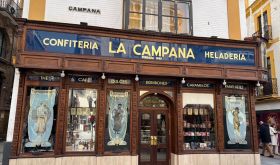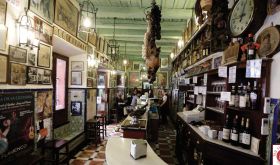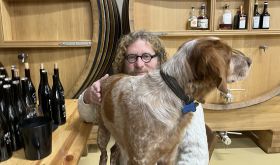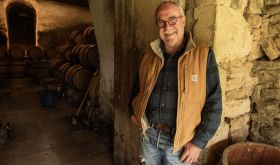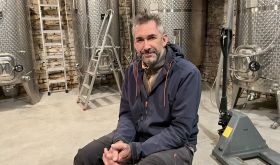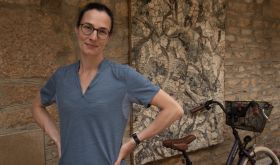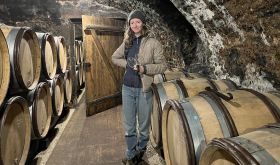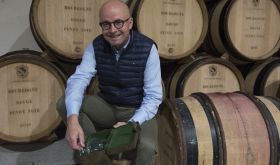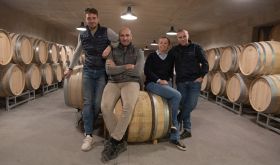The city of Bristol has had a long association with food and wine ever since the first shipment of honey and wine (then known as clairet) landed on its quayside from Bordeaux in 1487. Harvey’s and Avery’s maintained the wine connection; the influential George Perry-Smith once cooked there professionally, as did a young, highly talented and flamboyant Keith Floyd. For the past decade, however, the easy profits from the drinks business have tended to dominate, as in so many other cities around the UK, and its culinary reputation has rested principally on the broad shoulders of Stephen Markwick, once at Markwick’s but now based at Culinaria.
Happily, this now looks set to change. While Bristolians speak appreciatively of the recent opening of Goldbrick House, an even bigger statement is being made with the opening last month of Bordeaux Quay close to where that very first shipment landed over 500 years ago.
This has been the brainchild over the past two years of chef Barny Haughton and property developer John Pontin and it is far more than the sum of its numerous parts which encompass a bakery, shop and brasserie on the ground floor as well as a cookery school and a 110 seater restaurant above. Bordeaux Quay aims to be the country’s first environmentally sustainable restaurant.
Formerly a themed night club which boasted a run of 17 ladies’ lavatories and a 30 metre urinal in the gents, the building now has a far more respectable interior. Natural light and air flow have been maximised to minimise electric lighting and to dispense with air conditioning; there is a rainwater harvesting tank on the roof to collect water to flush the lavatories; as much equipment as possible has been reused to minimise what would have been sent to the landfill, and environmentally friendly materials have been used throughout. On the produce side, Haughton’s menus are sourced from local, organic suppliers, a practice he followed at his original restaurant Quartier Vert. They are being urged to use minimal, recyclable packaging while a food composting programme has been established with the council handling all the waste.
Surprisingly, however, Bordeaux Quay is as comfortable as it is worthy. The ground floor has a relaxed, open feel to it while the restaurant, overlooking the water, has the air of having been there for longer than just the two weeks it had been open when I visited in late September. One reason for this must be the intelligent appointment of Sean Sutcliffe of Benchmark Furniture, a company which has also been involved in numerous Conran restaurants, to design the predominantly wooden interior.
What also distinguishes this restaurant’s menus is that, because it has staked its claim so openly and completely to such an environmentally sensitive, organic approach, they are not littered with adjectives and lists of who produced what and where. There are a few leaflets by the reception desk, most notably one entitled The Good Veal Guide, to answer any questions but otherwise this holistic approach happily dispenses with the need for verbal clutter. The wine list is not restricted to organic producers, perhaps fortunately, but no enthusiast should miss the range of extremely well-made organic Bath Ales on draught in the bar.
Of the six dishes we ate, four were very good. A small bouillabaisse with red mullet, clams and a pungent rouille as a first course; two sparklingly fresh fillets of John Dory and monkfish, the former on a herb and vegetable broth, the latter with a fennel, orange, parsley and black olive salad and a damson crème brûlée. But like so many passionate chefs, Haughton was only interested in what had gone wrong when he came to talk to me after the meal.
“That the game terrine was dry is entirely my fault. I made ten using lots of good game in the Cookery School but I misread the dials on the new ovens so they stayed in there too long. That definitely won’t happen again,” he explained before noticing my guest’s unfinished chocolate truffle cake. Tasting it, he apologised and said that this was certainly not as good as the last one his kitchen had made. And although Bordeaux Quay’s first fortnight had already seen the departure of its initial head chef and general manager, Haughton remains optimistic. “Freddie Bird has joined us from Moro in Clerkenwell so he knows about the pressure of a very busy kitchen while Liz Payne, who was at Clarke’s in Notting Hill for 18 years, starts as my new head chef tomorrow and she knows all about the importance of maintaining standards.”
Haughton remains so optimistic not just because he sees the much bigger picture of what he has undertaken but also because he appreciates the stroke of good fortune which has brought him and Pontin together.
“Restaurants are generally very wasteful businesses and I believe that this is a challenge the whole profession has to address. Here we try and minimise this by buying whole lambs or half a pig or a side of beef and using everything that is available on them as well as working to a zero waste strategy. But it was after giving a lecture on ‘Waste in the Restaurant Industry’ to the Royal Society of Arts that I met Pontin and we started talking about how we could address this situation. He has been a successful property developer in Bristol for the past 30 years and has had the courage to spend the £3.2 million it has taken to open this place. I am obviously extremely excited but it is a lot of money to pay back.”
At this point in our conversation the dapper John Pontin, whom I could not help noticing is as thin as Haughton, joined us en route to his three o’clock meeting. He explained in a passionate almost evangelistic tone how his eyes had been opened by a series of lectures at the Royal Society of Arts to the challenges posed by climate change and the short time, no more than a decade be believes, that remains if we are to put into effect the crucial, necessary improvements. While he acknowledged the size of his investment, he too tried to put it into a larger context. “We are not here principally to make money but to make sense of a business that has to acknowledge its social responsibility. And as Peter Drucker, the late management guru, used to say, ‘you can stay in business a long time if you don’t lose money.’ Establishing the principle of zero waste, using the cookery school to educate lower income groups and laying down the principles of an ethical, socially responsible restaurant are more important to me than making money at this stage.”
I left convinced that, even in its infancy, Bordeaux Quay is a remarkable achievement. Its success will depend most obviously on the durability of the Haughton/Pontin partnership but also on Bristol’s becoming known as a centre of excellence for its restaurants as Ludlow in Shropshire has done. But as an example of all that sensitive chefs and property developers can achieve together, one can only hope that it will be copied quickly and often.
Bordeaux Quay 0117-943 1200, www.bordeaux-quay.co.uk
Goldbrick House 0117-945 1950, www.goldbrickhouse.co.uk
Culinaria 0117- 973 7999, www.culinariabristol.co.uk
Quartier Vert 0117-973 4482, www.quartiervert.co.uk
And not that far away, backing on to Cathedral Square in Wells,
Ian Bates’s excellent new restaurant, The Old Spot 01749-689099



